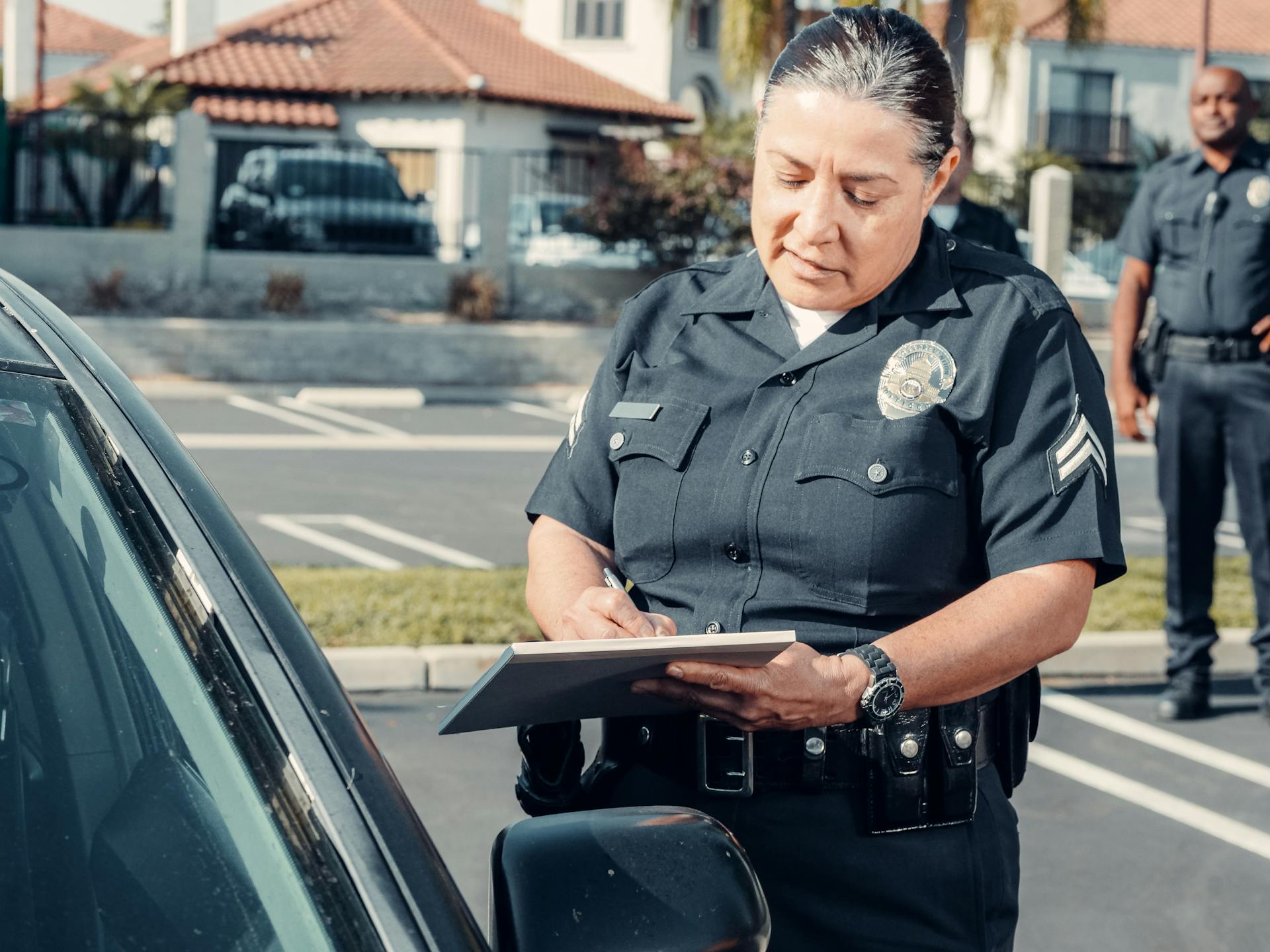
If you're a law enforcement officer or police officer, you're likely no stranger to debt. In fact, a significant number of law enforcement officers struggle with student loan debt.
The Public Service Loan Forgiveness (PSLF) program can provide much-needed relief, but it's not always straightforward. The PSLF program requires 120 qualifying payments over 10 years, which can be a challenge for officers who may have varying work schedules or deployments.
Fortunately, the PSLF program has been expanded to include more types of public service jobs, including law enforcement. This means that officers may be eligible for loan forgiveness even if they work for a non-federal agency.
Related reading: How Does Student Debt Forgiveness Work
Qualifying for Loan Forgiveness
To qualify for loan forgiveness as a police officer, you must work full-time for a qualifying employer, which includes government agencies at any level.
You can be part of a nonprofit organization exempt by the IRS under Section 501(c)(3) to qualify. However, labor union members and employees at partisan political organizations are not eligible, even if their employers have 501(c)(3) status.
Government law enforcement departments and agencies that may qualify for student loan forgiveness include city police departments, county sheriff offices, and the Federal Bureau of Investigation (FBI).
You must work at least 30 hours a week for a qualified employer. You can work multiple part-time jobs with qualified employers as long as the combined hours total at least 30 or more per week.
Here are some examples of government law enforcement departments and agencies that qualify:
- Bureau of Indian Affairs Police
- Central Intelligence Agency (CIA)
- City police departments
- College and university police
- County sheriff offices
- Drug Enforcement Agency (DEA)
- Federal Bureau of Investigation (FBI)
- Federal Bureau of Prisons
- National Park Service Rangers and Police
- National Security Agency (NSA)
- Naval Criminal Investigative Service (NCIS)
- State prison facilities or departments of corrections (DOC)
- Customs and Border Protection (CBP)
- Immigration and Customs Enforcement (ICE)
- Marshals Service
- Secret Service
If you have Perkins Loans, you may be eligible for up to 100% student loan forgiveness with five years of eligible service as a full-time law enforcement officer or corrections officer.
Perkins Loan Forgiveness
If you're a police officer, you may be eligible for Perkins Loan forgiveness. Perkins Loans were offered until 2017, but if you consolidated them into a Direct Consolidation Loan, you may still qualify for forgiveness.
To qualify, you must be employed full-time as a law enforcement officer or in another qualifying position. After five years of qualifying employment, you could be eligible to get up to 100% of your Perkins Loan forgiven.
The forgiveness process works as follows: 15% cancellation in the first two years, 20% cancellation in the third and fourth years, and 30% cancellation in the fifth year. This means that after five years, you could have up to 100% of your loan forgiven.
To get started, you'll need to contact your school's billing department to see if you qualify. Each school runs its own forgiveness program, so it's essential to reach out to them directly.
Here's a breakdown of the forgiveness process:
Keep in mind that Perkins Loans can be consolidated into direct loans, which qualifies you for Public Service Loan Forgiveness.
For more insights, see: Credit Forgiveness Car Loans
Eligibility and Disqualification
To qualify for loan forgiveness as a police officer, you must meet certain eligibility requirements. You must be a sworn law enforcement officer or have principal responsibilities unique to the criminal justice system.
Police officers working in private security firms or for-profit prisons are not eligible for Public Service Loan Forgiveness (PSLF). This is because PSLF only considers federal and non-profit employers as qualified.
Take a look at this: Umbrella Insurance for Police Officers
To qualify for PSLF, you must work full-time for a qualified employer, which is generally 30 hours or more per week. However, if you work part-time for two different qualifying employers and work more than 30 hours per week between the two jobs, you may still qualify.
Here's a breakdown of the employment eligibility for loan forgiveness as a police officer:
If you're unsure about your eligibility or have questions about the loan forgiveness process, it's best to reach out to your school or loan servicer for guidance.
Requirements
To qualify for student loan forgiveness as a police officer, your loans must be Direct Loans, borrowed from the federal government.
Private student loans are not eligible for loan forgiveness under Public Service Loan Forgiveness (PSLF).
You may need to consolidate your federal student loans before you qualify for PSLF.
Consolidation combines all your federal student loans into one new loan.
To qualify for PSLF, you must work full-time, which is generally 30 hours or more per week.
You might like: Federal Loan Consolidation Forgiveness

However, if you work part-time for two different qualifying employers and work more than 30 hours per week between the two jobs, you may still qualify.
To take advantage of PSLF, you must make 120 qualifying student loan payments.
This means you'll have to pay back your loans for 10 years, even if you're working full-time for a qualified employer.
If you miss a month or are more than 15 days late in making your payment, it won't count towards your 120 total.
Perkins Loans can be eligible for forgiveness if you consolidate them into a Direct Consolidation Loan.
You must be employed full-time as a law-enforcement officer to qualify for Perkins Loan forgiveness.
After five years of qualifying employment, you could be eligible to get up to 100% of your Perkins Loan forgiven.
For more insights, see: Do Loan Officers Work from Home
Perkins Cancellation Eligibility
To qualify for Perkins Loan cancellation, you must be a sworn law enforcement officer or have principal responsibilities unique to the criminal justice system. Those with administrative duties within law enforcement do not qualify.

You must be employed by a local, state or federal law enforcement or corrections agency or facility that is publicly funded. Full-time law enforcement and corrections officers are eligible for 100% loan forgiveness under the Federal Perkins Loan Cancellation program for service that includes August 14, 2008, and after.
Here's a breakdown of the cancellation process:
- Year one: 15% cancellation
- Year two: 15% cancellation
- Year three: 20% cancellation
- Year four: 20% cancellation
- Year five: 30% cancellation
To apply, you must contact the school that made the loan or the loan servicer the school has designated. If you have any questions, contact the school or loan servicer directly.
Readers also liked: Mortgage Loan Officer School
Applying and Repayment
To qualify for loan forgiveness as a police officer, you'll typically need to meet certain service requirements, such as working for a public agency or a non-profit organization for at least 10 years.
The Public Service Loan Forgiveness (PSLF) program can be a game-changer for police officers who meet its requirements. This program can forgive the remaining balance on your loans after you make 120 qualifying payments.
Take a look at this: Loan Officer Requirements
How to Apply
To apply for law enforcement student loan forgiveness, you need to follow these steps.
First, check your eligibility. For Public Service Loan Forgiveness (PSLF), you need to work full-time for a government or qualifying nonprofit employer and have Direct Loans.
Next, know your loan type. Log in to your Federal Student Aid account to see your loans. For PSLF and IDR forgiveness, consolidate Federal Family Education Loans (FFEL) or Perkins Loans into a Direct Loan if needed.
You'll also need to choose the right repayment option. PSLF and IDR forgiveness require an Income-Driven Repayment (IDR) plan or the standard 10-year repayment plan.
To ensure you're on the right track, certify your employment. Submit an Employment Certification Form each year or when you change jobs to confirm your employer qualifies.
Here's a summary of the application process:
Finally, apply when you're eligible. Use the PSLF Help Tool for PSLF after completing 120 payments, or contact your loan servicer to apply for Perkins Loan Cancellation.
A unique perspective: How to Check Pslf Payment Count
How Long Do Students Have to Work?

Police officers can work for just 5 years or up to 25 years to get debt relief.
You can qualify for up to 100% cancellation of your Perkins Loans after completing 5 years of eligible service.
To get student loan forgiveness through Public Service Loan Forgiveness, you must work full-time for a qualifying employer for 10 years, which translates to making 120 qualifying monthly payments.
Here's a quick breakdown of the time commitment for different student loan forgiveness programs:
Each program has different eligibility rules, so make sure to double-check that you qualify before applying.
Programs and Options
There are three law enforcement student loan forgiveness programs that police officers can take advantage of. The Public Service Loan Forgiveness program is particularly well-suited for law enforcement members due to its specific eligibility criteria.
Most police officers work with a government organization, making them qualified employers for this program. Police officers are eligible for exclusive opportunities to be on the receiving end of student loan forgiveness. Borrowers usually have to meet a few specific qualifications, like having a reliable payment history, while working in law enforcement.
Related reading: Student Debt Forgiveness Programs
Other Repayment Options
If you don't qualify for the top law enforcement forgiveness programs, there are still alternative options to tackle your student loan debt. Consider First Responder Loan Forgiveness Programs, which provide financial relief to those who serve the public in emergency situations.
These programs are often state-run or regionally based, and eligibility criteria can vary. Texas offers a Peace Officer Loan Repayment Assistance Program, which provides up to $20,000 over five years for eligible officers who have completed at least one year of service and meet educational requirements.
Other states may have similar programs aimed at attracting and retaining law enforcement personnel in high-need areas. The FBI Loan Repayment Assistance Program offers up to $10,000 per year in loan repayment assistance, with a maximum of $60,000 over six years for FBI agents.
If you're a law enforcement officer who can't work due to a permanent disability, you may be eligible for Total and Permanent Disability (TPD) forgiveness. This program forgives federal student loans completely, and eligibility can be established through a 100% disability rating from the VA Department, receiving Social Security Disability Insurance (SSDI) or Supplemental Security Income (SSI), or certification from a licensed medical professional.
Teacher Loan Forgiveness Program is also an option, which can forgive up to $17,500 of your loans if you work in an educational setting as part of your law enforcement duties.
Consider reading: Bible Debt Forgiveness 7 Years
3 Programs

If you're a law enforcement officer looking to forgive your student loans, there are several programs to consider. The Public Service Loan Forgiveness program is a popular option, particularly for law enforcement members, due to its specific eligibility criteria that align well with their employment.
Many police officers work with government organizations, which qualify them as eligible employers. This program is designed to help public servants, like law enforcement officers, forgive their student loans after making 120 qualifying payments.
The Public Service Loan Forgiveness program is not the only option, however. There are two other programs worth exploring: the Law Enforcement Student Loan Forgiveness program and the Student Loan Forgiveness for Public Safety Officers program.
Check this out: Pslf Loan Forgiveness Application
Options
Law enforcement personnel have several options for student loan forgiveness, including the PSLF program, which has helped officers repay student debt for over 15 years.
One option is the Public Service Loan Forgiveness (PSLF) program, which has been around for over 15 years and has provided relief to many law enforcement officers.
Police officers and others in law enforcement can also consider President Biden's recent policy, which aims to ease the burden of student debt.
The PSLF program can completely eliminate your debt, while other options may reduce it.
A fresh viewpoint: Debt Forgiveness Options
Do Programs Apply?

Police officers are eligible for exclusive opportunities to be on the receiving end of student loan forgiveness. They usually have to meet a few specific qualifications, like having a reliable payment history, while working in law enforcement.
To be eligible, borrowers typically need to have a steady income and a good credit history. This is because law enforcement agencies often require employees to have a certain level of financial stability.
Having a job in law enforcement can also provide access to exclusive forgiveness programs, such as Public Service Loan Forgiveness (PSLF) and Teacher Loan Forgiveness.
Refinancing and Discharge
Loan refinancing can be a viable option for law enforcement officials who don't qualify for Public Service Loan Forgiveness (PSLF). This involves taking out a new, private loan to pay off existing loans, which can include federal and private loans.
Lowering your interest rate through refinancing can lead to serious savings over the life of your loan, depending on the repayment term. You can also lower your monthly payment by extending the repayment term, but be aware that this may result in paying more interest over time.
If you're struggling with a disability, you may be eligible for a total and permanent disability discharge, which can provide full student debt relief. However, you must have a direct loan, FFEL Program loan, or Perkins loan to qualify.
For more insights, see: Private Loan Debt Forgiveness
Refinancing for Officials

For law enforcement officials, student loan refinancing can be a game-changer. It may help lower the cost of your student loan repayment, especially if you don't qualify for Public Service Loan Forgiveness (PSLF).
You can potentially decrease the total amount of interest you pay on your student loan by refinancing, which can add up to serious savings over the life of your loan.
If you're dealing with high loan payments, refinancing may help you lower your monthly payment by getting a lower interest rate and/or extending the length of the repayment term.
Keep in mind that refinancing federal student loans permanently forfeits eligibility for federal benefits and protections, including PSLF, income-driven repayment, deferment, and forbearance.
Total and Permanent Disability Discharge
If you're a law enforcement officer dealing with a disability, there's a possible way to get your student debt repaid. You'll need to have a direct loan, FFEL Program loan, or Perkins loan to qualify.
A disability can significantly impact your ability to work and perform basic tasks, making it challenging to manage your debt. This discharge option is available for law enforcement officers who have a disability.
To qualify for total and permanent disability discharge, you'll need to have one of the specified types of loans. This option can provide full student debt relief, but it's essential to note that it's not the most straightforward way to get your debt repaid.
Having a disability can be a game-changer in terms of your financial situation, and this discharge option can help alleviate some of the burden. However, it's crucial to meet the loan requirements to be eligible.
Discover more: Credit Card Debt Forgiveness for Disabled
Quick Facts
Police officers, corrections officers, and state troopers qualify for several law enforcement student loan forgiveness programs. This is a great perk for those who have dedicated their careers to serving and protecting their communities.
Perkins Loan Cancellation can cancel up to 100% of your loans after five years of qualifying service. This is a significant benefit for those who have committed to a career in law enforcement.
If none of the forgiveness programs work for your situation, refinancing your loans with a private lender could be a practical alternative. Be sure to research and compare rates before making a decision.
Here are some key details about the law enforcement student loan forgiveness programs:
- Police officers, corrections officers, and state troopers qualify.
- Perkins Loan Cancellation may cancel up to 100% of your loans after five years.
- Refinancing with a private lender may be an alternative option.
Frequently Asked Questions
Do first responders get student loan forgiveness?
Yes, first responders are eligible for federal student loan forgiveness programs. They can apply for the same loan forgiveness options as other borrowers with federal student debt.
Are there special loans for police officers?
Yes, there are special mortgage programs for police officers, offering more favorable terms and benefits to help them finance a home. These programs are designed to support first responders like police officers in achieving homeownership.
Sources
- https://www.incharge.org/understanding-debt/student/student-loan-forgiveness-police-officers/
- https://www.sofi.com/learn/content/law-enforcement-student-loan-forgiveness/
- https://www.tateesq.com/learn/student-loan-forgiveness-law-enforcement-cops
- https://www.moneylion.com/learn/student-loan-forgiveness-for-law-enforcement/
- https://www.bosfirecu.com/blog/student-loan-forgiveness-for-police-officers
Featured Images: pexels.com


